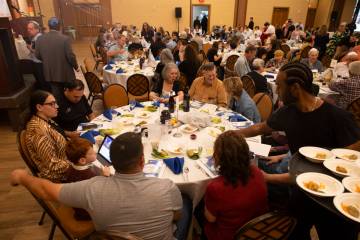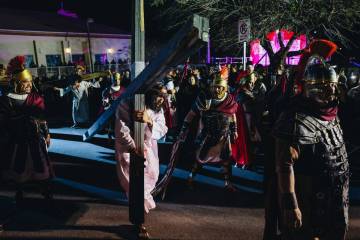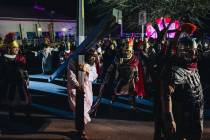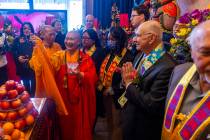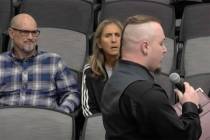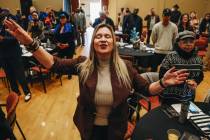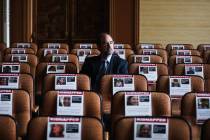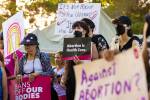Nevadans for the Common Good invites participation in public life
There’s an army in town, gathering momentum since the recession.
Its mission: the training of leaders for participation in public life. And, while this army may not be fighting a holy war, it has been turning heads with victories that promise a better future for the valley.
Bridging faiths and building relationships are all in a day’s work for Nevadans for the Common Good, an organization of 33 dues-paying religious institutions and nonprofits. It’s received much attention for its role in helping along the passage of Assembly Bill 67 into law, back in 2013. The law has made life harder for sex-trafficking pimps. It’s also reputedly eased the process for many young women detained on prostitution charges, who now say they’re more willing to testify against their traffickers because the law keeps them safer.
But human trafficking hasn’t been the only item on the agenda. Robert Hoo, lead organizer, described the group’s recent community convention as a night of “public business,” at which public officials gave commitments in a public setting on issues ranging from elder abuse and caregiving to immigration. According to Hoo, almost 1,600 attendees came to Cashman Center on a Tuesday night to address the issues. The organization’s first convention, two years ago, drew between 1,300 to 1,500 participants.
“It wasn’t a ballgame,” he noted. “It wasn’t a musical concert. It was people coming together to talk about issues. The interest is there, and it’s even grown.”
Representatives of various institutions in the audience at one point punctuated public business with cries of “We want more!” One on one, they echoed that sentiment — the desire for a better community — expressing faith in an organization with a track record that gives them hope.
“We are thrilled to be part of a nonpartisan group to make the valley a better place,” said Debbie Breslerman of Temple Sinai of Las Vegas. “It’s easy in this city to get lost. We want to help people get found.”
“Before I met Nevadans for the Common Good, I was just one kid splashing in the swimming pool, making a lot of noise,” mused Terri Porter. “But Nevadans for the Common Good is a tidal wave that can affect change.”
Porter retired and came to the valley last June to support her mother, but soon found herself facing a conundrum. An elderly woman who appeared to have early-stage Alzheimer’s disease confided in her about being abused in a home with several unrelated senior residents in Porter’s 55-plus, gated mobile home community.
The experience of making 34 phone calls to report the alleged abuse — and having various agencies refer her back to others — was part of the story Porter shared onstage at the convention.
The Rev. Bob Stoeckig, vicar general of the Diocese of Las Vegas and pastor at St. Andrew Catholic Community in Boulder City, co-chaired this year’s conference. He’s also one of the organization’s founders. It all began just as the economy downturned, he recalled.
Ideas that would give rise to Nevadans for the Common Good sprung from the Desert Southwest Conference of the United Methodist Church. The clergy began talking, not just among themselves but across denominational lines, according to Stoeckig. They soon enlisted the help of the Industrial Areas Foundation, a national network of community organizations specializing in the training and development of leaders and organizers.
“We, as clergy, began meeting together around the general concept of, what does it mean to be faithful in the midst of this economic calamity that was going on in Las Vegas, where many of us had parishioners who were losing homes, or losing jobs,” Stoeckig said. “How do we, as clergy, both support each other in that process and find effective ways to reach out to our people?”
While some have predicted that Nevadans for the Common Good would have to tread on toes to make a difference in people’s lives, Stoeckig hasn’t noticed many enemies. The organization’s relationship-building approach allows for continued dialogue, and the opportunity to join forces with others on some issues, in spite of disagreement on others, he said.
The group has trained about 500 community leaders in the past two years, according to Hoo. Training includes last fall’s three-day intensive training, and an upcoming issues conference to finalize legislative strategy later this year or early next year, along with weekly trainings at various member institutions. There’s also the continual hands-on work that characterized the group’s efforts in getting AB 67 passed: members organizing meetings with legislators; role-playing in preparation; and evaluating, post-meeting.
Barbara Paulsen, who attended the group’s first conference, quickly got a taste of “hands on” while working on AB 67. She met with legislators, traveled to Carson City twice and did trainings at her church, Boulder City United Methodist Fellowship, to educate others in her congregation and to galvanize support.
“Part of what appeals to me about this is, it’s larger than an individual issue,” she said. “Issues come and go. But if you build relationships, and you build trust, and you build a group of people who want to work together for a common good, that is much more enduring.”
Victory doesn’t always manifest merely in the form of legislation. Hoo cited the organization’s success in posting a human trafficking hotline number at McCarran International Airport and on buses and bus shelters throughout the valley, after a meeting with Clark County Commissioner Chris Giunchigliani.
The commissioner was among several public officials responding to calls for action at the recent community convention. Others included Nevada Attorney General Catherine Cortez Masto, Clark County School District Superintendent Pat Skorkowsky and Rep. Steven Horsford, D-Nev.
Teaching people the importance of their own story, and the skill of listening to the stories of others, is a critical part of the organization’s approach. Understanding the interests of others is the “beginning of public life,” Hoo said. Also important: teaching people how to think about power and not fear it.
“That, for a lot of people, is a new way of thinking,” he said.
PLATES ARE FULL
Here are some of the issues Nevadans for the Common Good plan to address:
• Follow-up on human sex trafficking
• Elder issues, including transportation, elder abuse in unlicensed group homes, respite care and support for family caregivers
• Immigration
• Education
















